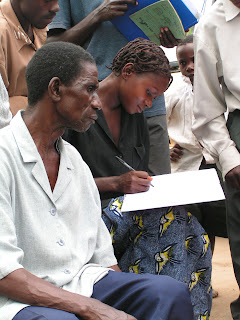We are so thankful for more than 100 families who received dairy goats in 2008, funded by the generosity of our friends and supporters in America. Once again this year we are offering the Give-a-Goat opportunity. For $130 we can purchase and transport a specially bred dairy goat here in Uganda, train a family in its care, give them a few tools for constructing a simple shed, and then allow them to take the goat home. Thanks to this project, many children who otherwise would have starved, can thrive—drinking the calories and protein they need. Most of our recipients are babies whose mothers have died, or whose mothers are infected with HIV/AIDS and therefore need to wean them from potentially infectious breast milk.
Your donation is a gift to a family which is about as close as one can come in 2008 to that of the homeless and wandering parents of the infant Jesus, living on a slim margin of survival. The first 100 donors will receive a hand-made African Christmas tree ornament which symbolizes the real gift of the goat. Please put it on your tree to remind you that Christmas is all about incarnation: love in bodily form, God becoming human and needing milk, your generosity translating into a real live animal and its milk.
The mechanics:
1. Use the "Give-a-Goat" button on our sidebar (or at www.whm.org) to donate by credit card. This is the simplest and fastest method, and allows our colleague Ginny Barnette in the Sending Center to quickly confirm your donation and address and mail you the ornament. Here is the direct link : http://whm.org/project/details?ID=12375
2. Send a check to WHM Donation Processing Center, P.O. Box 1244, Albert Lea, MN 56007-1244, writing "Goat Fund 12375" on the memo line. Since the processing and return of the information to Ginny could take a couple of weeks, you may want to email her (GBarnettte@whm.org) in order to be sure you receive the ornament before Christmas.
3. If you would like the ornament mailed to a DIFFERENT address than the one on your credit card or check, you must also communicate this to Ginny. A card will be included with each goat describing the program.




















































